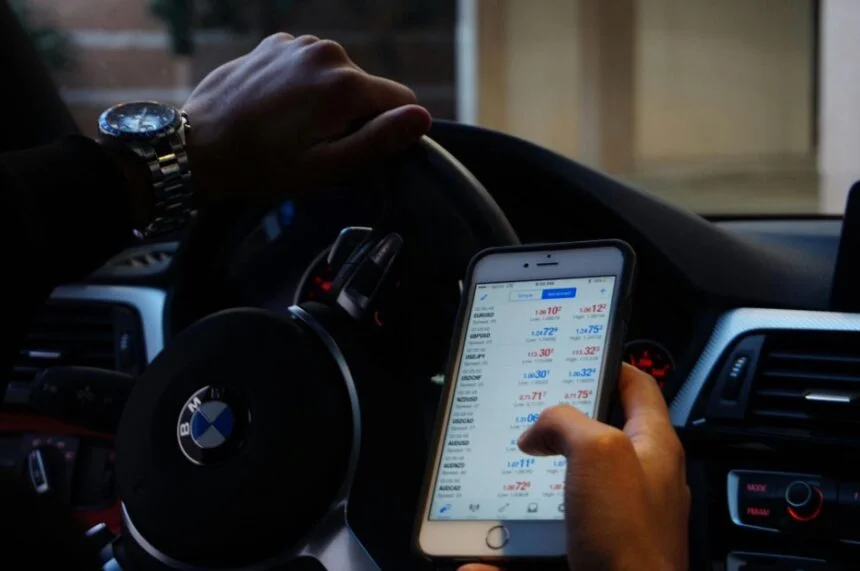New laws went into effect in March 2022 that prohibit holding and using handheld cellphones while driving, with certain exceptions for drivers using GPS or in emergency situations.
An experienced traffic attorney may be able to reduce a cell phone or texting ticket without it leading to points on a driver’s record.
Fines & Penalties
UK laws are extremely stringent about using mobile phones while driving and will punish drivers who do so with both fines and penalty points. These penalties are intended as deterrents as there has been plenty of research showing how cell phone usage behind the wheel increases the risk of accidents.
Drivers caught using hand-held devices while operating a vehicle can incur fines of up to PS200 and receive six penalty points; accumulating twelve or more penalty points within three years could lead to the suspension or cancellation of their license altogether.
If you are pulled over for using a cell phone while driving, there are ways to dispute the ticket. One is providing evidence showing you were not using it during that period. When you consult a motoring lawyer such as Caddick Davies, they will have strategies for collecting such evidence. This could include having witnesses attest that you were not using the device at that moment in time or using cell phone data that shows this was indeed not occurring at that moment in time.
One way to challenge a ticket is to show that using the device for special reasons was necessary – such as calling emergency services, or making hands-free calls when it is unsafe or impractical to stop. Drivers may also use hands-free mobile phones while driving provided that it is mounted securely and does not obscure their view of the road.
Educate Yourself
Cellphones are only one potential driver distraction; any action that diverts your eyes, mind, or hands away from the road increases your risk of an incident, including eating, drinking, grooming, changing music tracks, using navigation systems, and reading.
Drivers using cell phones for any reason – be it hands-free or otherwise – increase crash risks two to six times higher than drivers who remain undistracted by phone conversations. Even when your eyes remain on the road, talking on a cell phone reduces reaction time and increases lane deviations; just dialing a number takes your attention away for 3.8 seconds at 55 mph which is enough time to travel the length of a football field!
Text messaging while driving can be particularly dangerous, but that is not the only use for cellphones while driving. Composing, sending, and reading texts while driving; using GPS; listening to radio stations; or conversing with passengers are also activities that use cellphones while driving and should not be disregarded as potential ways of using them while doing so.
Educate Your Child
Parents must set an example by not using phones or devices while driving. Teens should understand all the responsibilities that come with driving – including financial obligations such as filling up gas tanks and paying car insurance premiums as well as adhering to traffic laws regarding passengers.
Prior to their first driving experience, parents must communicate clearly with their child on what the ground rules will be and enforce them consistently. Should your teen break the rules, be sure they understand any potential repercussions and discuss these with him or her before engaging in driving activities together.
Cellphone use while driving can be an extremely hazardous distraction, leading to lane departures, slower reaction times, and inattention blindness – where drivers miss things that are immediately in front of them. According to estimates, crash risks for distracted drivers are two to six times greater compared to non-distracted drivers.
Educate Others
Talking on a phone and driving is an extremely high-risk combination, even with hands-free devices like Bluetooth devices. Studies have revealed that drivers who use their phones (handheld or hands-free) while driving are four times more likely to become involved in an accident compared to drivers not using phones; texting increases that risk even further. You can click the link: https://www.statista.com/statistics/310188/opinions-on-using-mobiles-while-driving-in-great-britain/ to learn more about mobile driving rates.
Education is key in fighting distracted driving. Most teenage drivers may not know the laws regarding cell phone usage while driving; fortunately, most schools offer educational programs that can inform students about both its dangers and related laws; such programs should cover details on differences in state laws as well as any restrictions placed upon cell phones.
At present, thirty-five states and the District of Columbia have hand-held cell phone use bans; some also include texting bans or restrictions on using certain electronic devices while driving. Unfortunately, their effects vary; some states seem unaffected while others experience significant change from these bans due to several factors including law wording, punishments, or other variables.





